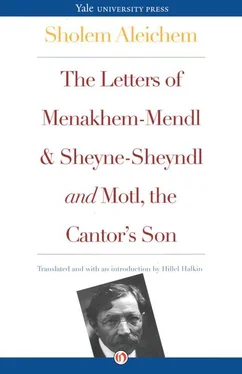It didn’t start out like much, just a strip of black cloud at the edge of the sky soon after Kol Nidrei. My friend Mendl was the first to notice it. That’s because all the other Jews were still yammering below and reciting Psalms after the prayers. Mendl and I had gone for a walk around the ship and were sitting quietly in a corner. It was a calm, warm night and we were feeling happy and a little sad. I don’t know what Mendl was thinking. I was thinking about God. I was thinking how big he must be, sitting up there in charge of everything. How did it feel to be prayed to and praised by so many Jews pouring out their hearts to you?
My mother says God hears and sees everything and knows my every thought. I was hoping she was wrong, because just then I was thinking of a juicy apple, a sweet pear, and a nice glass of cold water. The potatoes were giving me heartburn.
Elye would kill me if he caught me drinking on Yom Kippur. He wanted me to fast the whole twenty-four hours, even though I wasn’t thirteen. “We’ll see about that,” my mother said. Now she was looking for me everywhere. A sailor showed her where Mendl and I were sitting in the prow. “Motl?” she yelled. “Motl!”
“What is it, Mama?”
“You know what it is! Go to sleep! Have you forgotten you have to get up early tomorrow? It’s Yom Kippur.”
Not that I wanted to, but I went to bed.
The sky was black when we woke in the morning. The sea was angry and wild, its waves higher than the ship. They tossed the Prince Albert up and down like a toy. The sailors staggered like poisoned mice. The stewards clung to the railings. The passengers hugged the walls and reeled with each step.
All at once it began to pour buckets. The thunderclaps came one after another. God was whipping on his chariot — and on his holiest day! Bolts of lightning flashed across the dark sky. The Prince Albert groaned and rolled with the waves. The rain pelted down. It felt like a second Noah’s flood. But hadn’t God sworn that the first was the last?
“Crossing the Red Sea was nothing compared to this,” said my brother Elye.
“Nothing!” Pinye echoed. It was the first time I had ever heard them agree.
The comparison caught on. Before long everyone was looking out the portholes and talking about the Red Sea. I mean everyone who didn’t run to the deck to puke his empty guts out. Yom Kippur? Prayers? Who could even remember what day it was?
The first to break down in our family was Brokheh. For a while she screamed she was dying. Then she began swearing at Elye. What ever made him think of going to America? She had known all along that Siberia was better. Why, Siberia was gold next to America!
My mother came to Elye’s defense. She tried explaining that all things came from God and had to be borne. It said in the Bible …but my mother never said what it said in the Bible because just then she turned green. One look at her made Taybl sick too.
Pinye thought it was funny. “Just look at them!” he declared. “Women are one big laugh.” He jammed his cap down sideways and stuck his hands in his pockets. “They’re ninnies! What do I care if there’s a storm and the ship is rolling? I use my brains and figure out what to do. When the ship rolls that way, I bend this way; when it rolls back this way, I bend that way. It’s called keeping your equilibrium.”
As Pinye was showing us his equilibrium, my brother Elye started looking pretty bad. Soon the two of them rushed outside to chuck up whatever was still in them. So did the other passengers. Then everyone dragged himself off to his bunk and collapsed like a bale of hay. And we weren’t across the Red Sea yet!
Mendl and I held out the longest. Mendl had been taught a trick by a fellow emigrant, an old sea hand who liked to give advice. He had been to America three times. The trick, he said, was to stay on deck with your eyes on the horizon while pretending you were riding a sleigh. Before long the old sea hand was sprawled out like a corpse and Mendl and I were soaked to the bone. We couldn’t walk a straight line back to our bunks. We had to be taken by the hand and led there.
How long did crossing the Red Sea take? Maybe a day and maybe two or three. I can’t rightly say. All I remember is how good it felt to be alive when it was over. The sky was pure as gold. The sea was smooth as glass. The Prince Albert skimmed the water looking like new, churning foam and spray in all directions. The passengers revived and flocked to the sunshine to enjoy a bright new day.
Soon word got around that land was almost in sight. Mendl and I were the first to spread the good news that we had spied it. At first it was a yellow speck on the horizon. Then the speck grew bigger and clearer. Ships appeared in the distance. Lots and lots of them with tall, thin masts.
All our troubles were forgotten. The passengers hurried to put on their best clothes. The women made themselves up. Elye combed his beard. Brokheh and Taybl went to get their good scarves. My mother put on her silk shawl. Mendl and I had nothing to do. But there was no time anyway. We were docking in America. All eyes shone with joy. The Jews who crossed the Red Sea must have felt the same way. That’s why they started to sing.
“Hail to thee, Columbus! The Old World greets thee, O land of freedom — O blessed, golden land!”
That was Pinye’s hello to America. He even doffed his cap and made a deep bow. Being half blind, he crashed nose first into the sooty head of a sailor. It’s a lucky thing the sailor was a decent goy. He just looked at Pinye’s bloody nose, grinned, and grunted into his mustache. It must have been one swell American curse.
Suddenly there was a commotion. The steerage passengers were requested to return to their places. At first the sailors were polite. Then they weren’t. Whoever didn’t move fast enough was made to.
There we were, young and old, men, women, and children, Jews, Christians, Gypsies, and Turks, with an iron chain on the door and no air. All we could do was stare through the portholes. It was worse than being seasick. We looked at each other like prisoners. “Why now? Why us?” my friend Mendl demanded with blazing eyes.
The first- and second-class passengers were being let down a long gangway that must have had a hundred steps. But what about us? Didn’t we get off here too?
“The likes of us can be made to wait,” said a Jew, a leech of a tailor from Heysen.
As leeches go he wasn’t a bad sort, a snazzy dresser who wore fancy glasses, thought a lot of himself, and liked chewing your ear off. He liked to argue too and had already had a few fights with Pinye. It was all Elye could do to break them up. In the end the tailor had declared himself so insulted that he stopped talking to Pinye entirely. Not only had Pinye called him “Needle Pusher,” “Thread Eater,” and “Seamsterman,” he had thrown in “Fabric Filcher” too.
Now that we were behind bars, though, the tailor talked nonstop even to Pinye. Half of what he said was in Hebrew:
“ Meh onu umeh khayeynu —what do folks like us count? Moshul kekheres hanishbor —we’re just so much scrap in their eyes. Except that real scrap isn’t thrown away so easily …”
Did he get it from Pinye! What kind of comparison was that? He should wash his mouth with soap, the tailor should, for talking that way about America! He really gave it to him, Pinye did. You can’t say a bad word about America when Pinye is around. Not that the tailor thought he had said anything bad. All he had said, said the tailor, was that America was a fine place but not for us. We were going nowhere fast.
That was too much for Pinye. He shouted: “What do you think they’re going to do, salt us away in a herring barrel?”
Читать дальше












